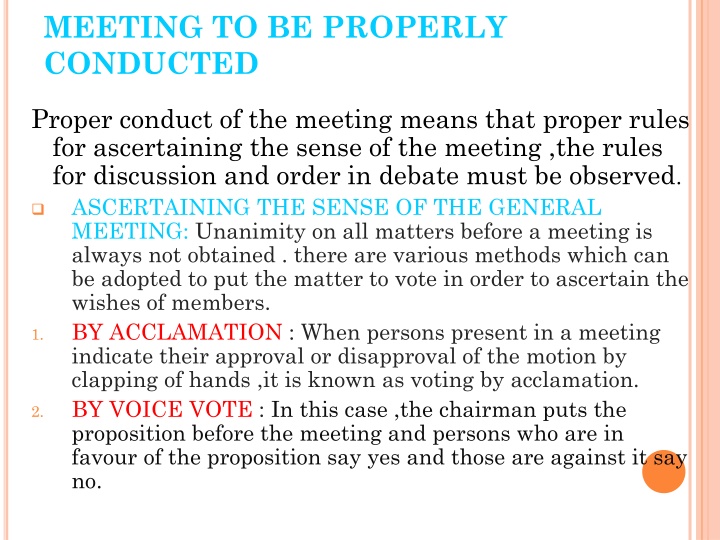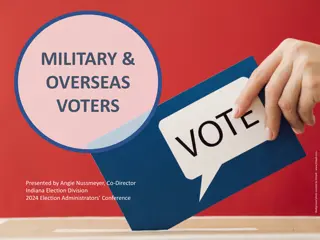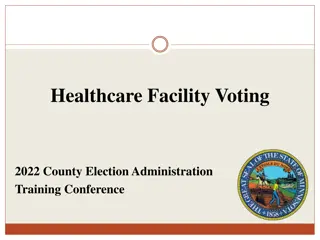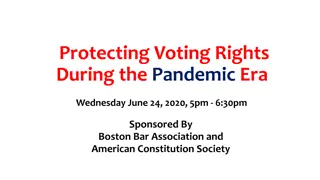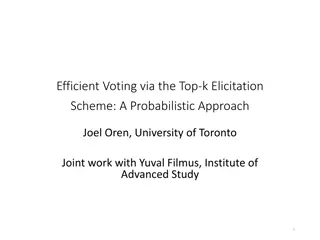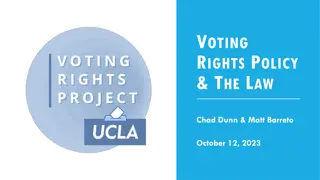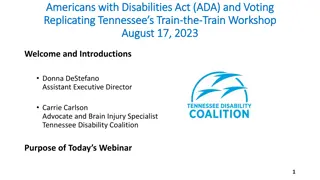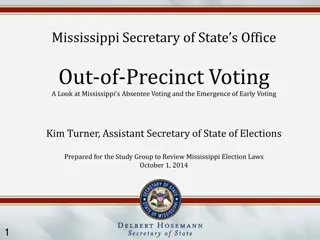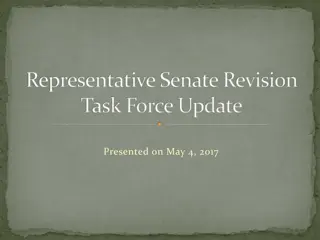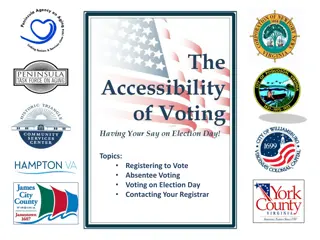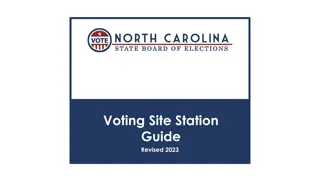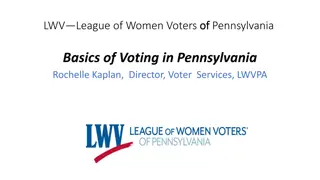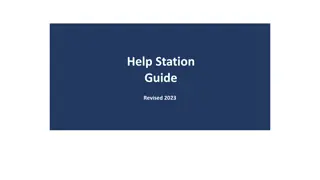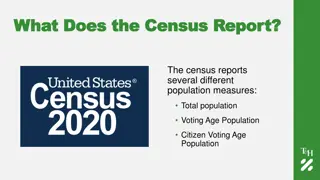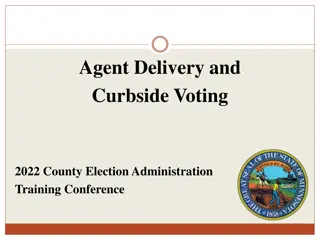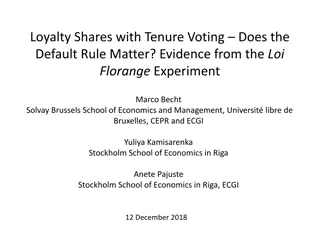Proper Conduct of Meeting and Voting Rules
Proper conduct of a meeting is essential for ascertaining the sense of the participants. Various methods such as acclamation, voice vote, division, show of hands, ballot, and poll can be used to determine the wishes of members. Rules for voting by equity shareholders, preference shareholders, holders of share warrants, joint holders, insolvent shareholders, and proxies are outlined. Electronic voting systems are also explained, emphasizing cyber security measures.
Download Presentation

Please find below an Image/Link to download the presentation.
The content on the website is provided AS IS for your information and personal use only. It may not be sold, licensed, or shared on other websites without obtaining consent from the author.If you encounter any issues during the download, it is possible that the publisher has removed the file from their server.
You are allowed to download the files provided on this website for personal or commercial use, subject to the condition that they are used lawfully. All files are the property of their respective owners.
The content on the website is provided AS IS for your information and personal use only. It may not be sold, licensed, or shared on other websites without obtaining consent from the author.
E N D
Presentation Transcript
MEETING TO BE PROPERLY CONDUCTED Proper conduct of the meeting means that proper rules for ascertaining the sense of the meeting ,the rules for discussion and order in debate must be observed. ASCERTAINING THE SENSE OF THE GENERAL MEETING: Unanimity on all matters before a meeting is always not obtained . there are various methods which can be adopted to put the matter to vote in order to ascertain the wishes of members. BY ACCLAMATION : When persons present in a meeting indicate their approval or disapproval of the motion by clapping of hands ,it is known as voting by acclamation. BY VOICE VOTE : In this case ,the chairman puts the proposition before the meeting and persons who are in favour of the proposition say yes and those are against it say no. 1. 2.
. 3. BY DIVISION :Under this method the chairman requests the members present in the meeting to divide themselves into two blocks one in favour of the proposal and another against it. 4. BY SHOW OF HANDS : Under this method ,the chairman asks all those in favour of the resolution to raise their right hand and when that number is noted , asks all those against , to do likewise. 5. BY BALLOT : Under this method, every person present records his voice on a ballot paper and deposits it in the ballot box provided for that purpose. 6. BY POLL : In company meeting , voting by poll is according to the number of shares held by a member. It is possible that some of the members present may keep quiet in the voting without expressing yes or no or may they all take part in voting.
2.RULES AS TO VOTING RULES OF VOTING FOR EQUITY SHAREHOLDERS : Every member of a company limited by shares and holding any equity share capital therein have right to vote , in respect such capital , on resolution placed before the company. RULE OF VOTING FOR PREFERENCE SHAREHOLDERS : Preference shareholders can vote only on the resolution directly affecting them HOLDER OF SHARE WARRANTS : The bearer of a share warrant can vote only if the articles of association of the company provides for it . JOINT HOLDERS: Joint shareholders ,the vote of the senior joint holder, whether in person or by proxy, shall be accepted to be exclusion of the votes of other joint holders. INSOLVENT : An insolvent shareholders is entitled to exercise the right to vote provided his name appears on the register of members. PROXY : A proxy is entitled to vote only on a poll and not on a vote by show of hands. VOTING BY POLL : A vote by a show of hands in only a rough and
E- VOTING Voting through electronic means : Every listed company having not less than one thousand shareholders, shall provide to its members facility to exercise their right to vote at general meeting by electronic means. A member may exercise his right to vote at any general meeting by electronic and company may pass any resolution by electronic voting system . The expression VOTING BY ELECTRONIC means or ELECTRONIC VOTING SYSTEM means a secured system based process of display of electronic ballot , recording of votes of the members and the number of votes polled in favour or against , such that the entire voting exercise by way of electronic The expression CYBER SECURITY means a protecting information ,equipment , devices and information stored in from unauthorized access , use destruction , modifications . i. ii.
PROCEDURE A company which opts to provide the facility to its members to exercise their votes at any general meeting by electronic voting system shall follow the following steps : The notice of the meeting shall be sent to all the members , auditors of the company The notice shall also be placed on the website of the company The notice of the meeting shall be clearly mentioned that the business may be transacted through electronic voting system. The notice shall clearly indicate the process and manner for voting by electronic , including the time period by which votes may be casts . The e-voting shall remain open for not less than one day and not more than three days . At the end of the voting period , the portal where votes are cast shall forthwith be blocked.
RESOLUTIONS Decisions of the company are made by resolution of its members , passed at meeting of members . The word resolution has not been defined in the companies act . A proposal when passed and accepted by members becomes resolution . Three kinds of resolution are recognised by the companies act . o Ordinary resolution [ sec. 114 (1) ] o Special resolution [ sec. 114 (2) ] o Resolutions by postal ballot ( sec 110 A ) o Resolutions requiring a special notice . [ sec. 115]
ORDINARY RESOLUTIONS [ SEC.114(1) An ordinary resolution is one which is passed at a general meeting by simple majority of members entitled to vote therein . The important items of business of a company which can be transacted with ordinary resolutions are: Approval of stautory reports Election of directors Declaration of dividend Appointment of sole selling agents Issue of shares at a discount Appointment of auditors and fixing their remuneration Appointment of another director in place of the one removed
SPECIAL RESOLUTION A resolution shall be a special resolution when . The intention to propose the resolution as a special resolution has been duly specified in the notice The notice required under the act has been duly given A copy of every special resolution together with the copy of the explanatory statement shall, within thirty days of the passing resolution be filled with the registrar who shall record the same. A special resolution is required for the following purposes. To alter the provisions of the memorandum for changing the place of registered office [sec 13] To change the name of the company [ sec. 13] To create reserve capital. To alter the articles of the company .[ sec. 14] To reduce the share capital of the company [sec 66] To make the liability of directors unlimited To wind up the company voluntarily [ sec. 304]
RESOLUTION REQUIRING SPECIAL NOTICE . [SEC . 115] Where , by an provision contained in this act or in the articles of a company , special notes is required of any resolution , notice of the intention to move such resolution shall be given to the company by such number of members not holding less than 1%of total voting power or holding shares on which such aggregate sum not exceeding 5 lakh rupees , as may be prescribed has been paid up Rule 23 of the companies rules , 2014 , in this regard , provide as follows : The notice shall be sent by members to the company not earlier than three months but at least 14 days before the date of meeting at which the resolution is to be moved. The company shall immediately after receipt of the notice , give its members notice of the resolution at least 7days before the meeting . The notice shall be published at least 7 days before the meeting , exclusive of the day of publications of the notice and day of meeting.
PASSING OF RESOLUTION BY POSTAL BALLOT It is generally noticed that members of a listed company are widely dispersed and there is very poor attendance at the general meeting . The meetings are normally attended by the promoters , their friends and associates who collects proxies and by large resolutions passed unanimously and without any dissent. List of items that must be transacted through postal ballot Alteration of the objects clause of the memorandum and in case of the company in existence immediately before the commencement of the act . Alteration of articles of association in relation to insertion or removal of provisions which , under sec 2 (68) are required to be included in the articles of a company . Change in the place of registered office outside the local limits of any city town or village as specified under sec 12 (5) Buy-back of shares by a company under sec 68(1) Election of a director under section 151
PROXIES [ SECTION 105 ] The word proxy may mean any of the following 2 things A person appointed to represent another and vote at the meeting on behalf of another, and The instrument by which a person is appointed a proxy. NOTICE OF THE MEETING [ SEC 105 (2) ] Every notice calling a meeting of company having a share capital or the articles of which provide for voting by proxy at meeting , must mention with reasonable prominence a statement that a member entitled to attend and vote is entitled a proxy and that a proxy need not be a member . RIGHTS OF PROXY A proxy can demand a poll u/s 109 A proxy can vote only on a poll A proxy can use his votes differently DISABILITIES OF PROXY A proxy has no right to speak at a meeting [ sec 105] . Hence , he can not take part in any discussion . A proxy is not counted for the purpose of quorum . I. II. I. II. III. I. II.
MOTION The term motion indicates a proposal made at a meeting by any member . Such a motion may be passed without any change or modification. AMENDMENT : An amendment is proposed alteration or modification in the terms or wording of the motion which is yet to be considered by the meeting , an amendment to a motion may- Add some new words to the motion or Replace some words of the motion by some other words or Drop some words from the motion FORMAL MOTION : A FORMAL MOTION is a motion relating to the procedure at a meeting and is moved for the purpose of interrupting or delaying or speeding up the discussion on a motion . THE CLOSURE MOTION : this motion is moved in order to close a prolonged and useless discussion on a motion . PREVIOUS QUESTION : the object of moving this motion is to prevent a vote being taken on the main motion under discussion . NEXT BUSINESS : this motion is moved in order to shelve discussion on the main motion before the meeting . POINT OF ORDER : A point of order deals with the conduct or procedure of the meeting . There are bases upon which points of order can be called : INCORRECT PROCEDURE : e.g. speaking far longer than the time allowed , speaking out of turn and so on. IRRELEVANCE : When the speaker is speaking outside the scope of the notice . UNPARLIAMENTARY LANGUAGE : It is bad language , such as personal abuse . 1) 2) 3) 1. 2. 3. a. b. c.
MINUTES OF THE MEETING [ SEC 118] The term MINUTES mean the official record of the meetings of a company. Minutes are like a precis , not a narrative : every company is required to keep minutes of the proceeding of: Every general meeting Every meeting of board directors and Every resolution passed by postal ballot SIGNING OF MINUTES : each page of every minutes a proceeding shall be initialled or signed and the last page of the record of proceeding of each meeting in such book shall be dated and signed MINUTES NOT TO BE ATTACHED BY PASTING OR OTHERWISE : Minutes of the proceeding of a meeting shall not be attached to any such book by pasting or otherwise. LOOSE LEAF MINUTES : a company may keep its minutes of meeting in loose leaf binders provided the following conditions are satisfied. The pages containing minutes are duly typed and serially numbered The loose leaves are kept in safe custody under lock and key 1. 2.
PENALTY If default is made in complying with the foregoing provisions, the company shall be liable to a penalty of rs 25,000 which may extend to rs 100,000 and every officer in default to a penalty of rs 5,000. MINUTES TO BE EVIDENCE : Minutes of the meeting kept in accordance with the provisions of sec 118 shall be evidence of the proceedings, recorded therein. LOCATION AND INSPECTION OF MINUTES BOOK :The minutes books of the general meeting of a company must be kept at the registered office of the company must be open during business hours for the inspection of any member without change for at least two hours a day . PUBLICATION OF REPORTS :No document purporting to be a report of the proceedings of a general meeting of a company can be circulated or advertised at the expense of the company unless it includes the matter required by section 118, to be contained in the minutes of the proceeding of such meeting.
